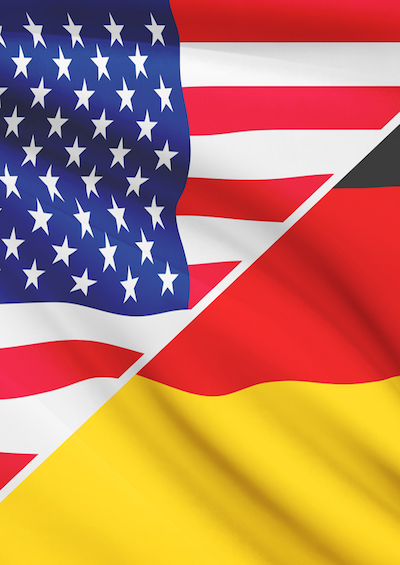Trump and Germany: On Trade Imbalances and Exchange Rates
Germany should point out to Trump that it is his own irresponsible macroeconomic policies that make the dollar strong and the euro weak.
March 10, 2017

President Trump is a man on a mission, to the tune of several earth-shaking ones a week. After Mexico, this time it is Germany’s turn.
Going mano a mano with Germany
Another staggering current account surplus of near 9% of German GDP has caught his administration’s eye. Clearly, the euro too weak, the Trumpists argue. They want to have a mano-a-mano talk with the Germans, outside of WTO and EU structures.
Rampant bilateralism is the only way in which the Trump administration can imagine the world. Otherwise, the world clearly gets too complicated for him and them.
It ain’t so easy
But whatever Mr. Trump’s desires, the world of exchange rates doesn’t move to the tune of the unilateral issuance of executive orders. Here is an inconvenient fact: There is a market out there that actually establishes those (market) rates.
Still, there are some serious questions to be answered – none bigger than this: If the euro is too weak (and the dollar too strong), who dunnit?
And: Is Germany taking advantage of the United States? And what can the U.S. government possibly do to rectify the imbalances.
The President, for all his assumed omnipotence, will be in for a surprise the who’s dunnit. He will also find to his great dismay that the world of currencies and revaluations and devaluations has changed.
The old world
Under the Bretton Woods Agreement, signed in July 1944, the exchange rates of the major countries were fixed, with the U.S. dollar acting as the reserve currency, at an agreed price to gold of US$35 per ounce.
This system made business transactions between nations again possible after WWII and led to a rapid increase in world trade.
Over time, however, this regime started to create increasing imbalances between countries. Britain, economically ever more lacklustre, had to devalue its currency in 1967 against the dollar, from 2.80 to 2.40.
Similarly, an economically resurgent German deutschmark was revalued, from 11.20 to 9.60. Even so, the UK trade deficit did not go away though and further devaluations of Sterling became necessary.
As an importer of engineering products from Germany at the time, I had to buy DM forward in order to protect myself against these gyrations in the markets. At first, is wasn’t easy to get reasonable cover as there was not enough liquidity around in the market.
Brave new world
Soon enough, the banks and other Fintech companies became aware of the fact that there was a lot money to be made in the foreign exchange business and that, in order to tap into these profit opportunities, there was no need for an underlying trade in the real economy to occur. The currency casino started to gear up big time.
With North Sea oil coming on stream in the late 1970s and 1980s, and with the UK service sector expanding after Big Bang with the massive deregulation of the financial sector, Britain’s current account stayed more or less in balance.
UK runs out of steam
Selling a huge number of assets — from luxury homes in London to the energy sector, ports and airports as well as numerous companies — helped to keep the UK’s current account in balance.
During the last decade, however, this situation has reversed dramatically. Both trade and services are now showing growing deficits.
The UK current account deficit, as of 2016, stands at around 5% of GDP, probably because much of what could be sold off to foreigners has been sold off.
Even so, this period of growing current account deficits coincided with the opposite of what one would expect — a period of relative strength for Sterling, which was only interrupted by the Brexit vote.
During the same period, the eurozone has developed a growing current account surplus (in 2016 amounting to around Euro 400 billion).
However, contrary to what one would expect – a strengthening of the euro, to reflect the strong fundamentals — the euro remains weak.
As goes the UK, so does the US
Why am I telling this UK story? Because it foreshadows developments with regard to the United States. Despite a huge current account deficit there, the U.S. has to contend with a strong dollar.
How does Germany fit into all this? It has, of course, contributed around three quarters of the eurozone’s current account surplus.
Can Trump make the mental leap?
Somebody has to explain to Mr. Trump that the rules of the current account/forex game have changed significantly. Of course, the U.S. dollar is overvalued in PPP terms. However, the dollar will remain strong and even may appreciate further.
Particularly so if – and this is where it gets interesting — Trump goes on a spending spree and inflation picks up. He won’t have much choice under those circumstances but to introduce defensive tariffs to compensate for the strong dollar to fend off imports.
His advisers may have foreseen this – hence all the noise about “putting the U.S. first” and hitting out at the world.
The real world doesn’t matter that much anymore
What is fairly new, of course, is that currency adjustment don’t follow any more what is happening in the real economy. Rather, they are determined by interest rate expectations and movements.
Ask any currency broker and he/she will confirm this. The problem with this new scenario is that the imbalances will be getting worse as the deficit countries like the U.S. and UK are expected to be the first to raise interest rates.
What then is the reason behind the performance of the real economy no longer being the main driver for currency adjustments in the short and medium term?
The answer is simple: The volume of the currency trade needed for “real economy transactions” – which still shape our collective mind about exchange rate developments — is totally dwarfed by the volume of speculative currency transactions traded each day in the financial markets.
Just how dwarfed? By 5 trillion a day total market.
We clearly live in financial times.
